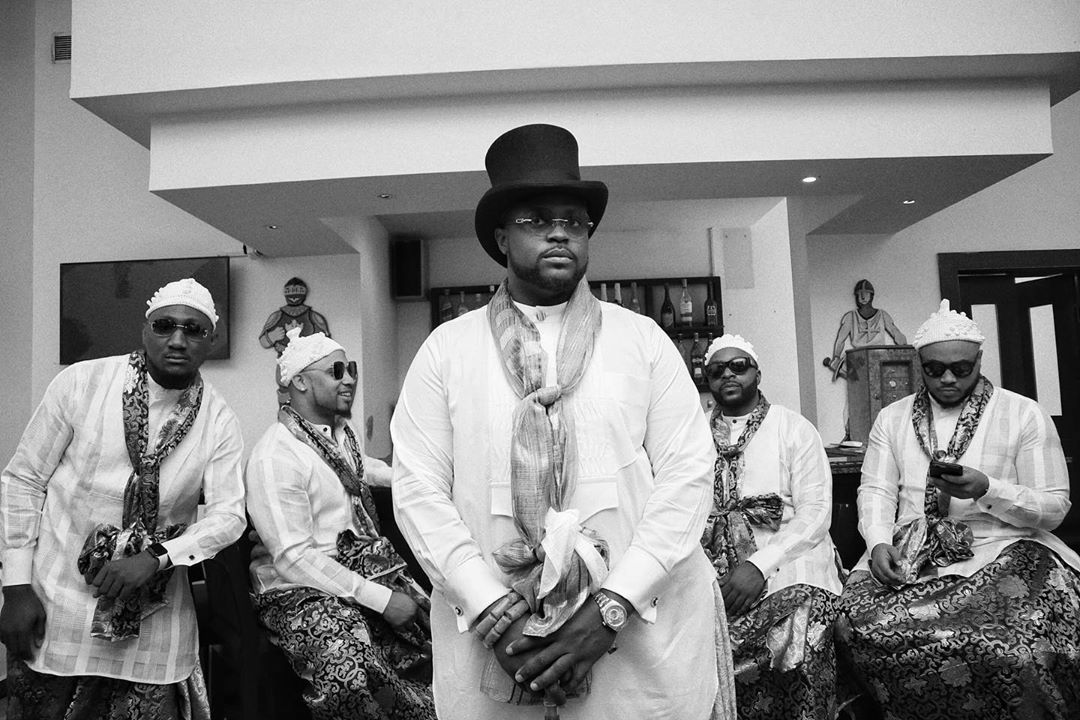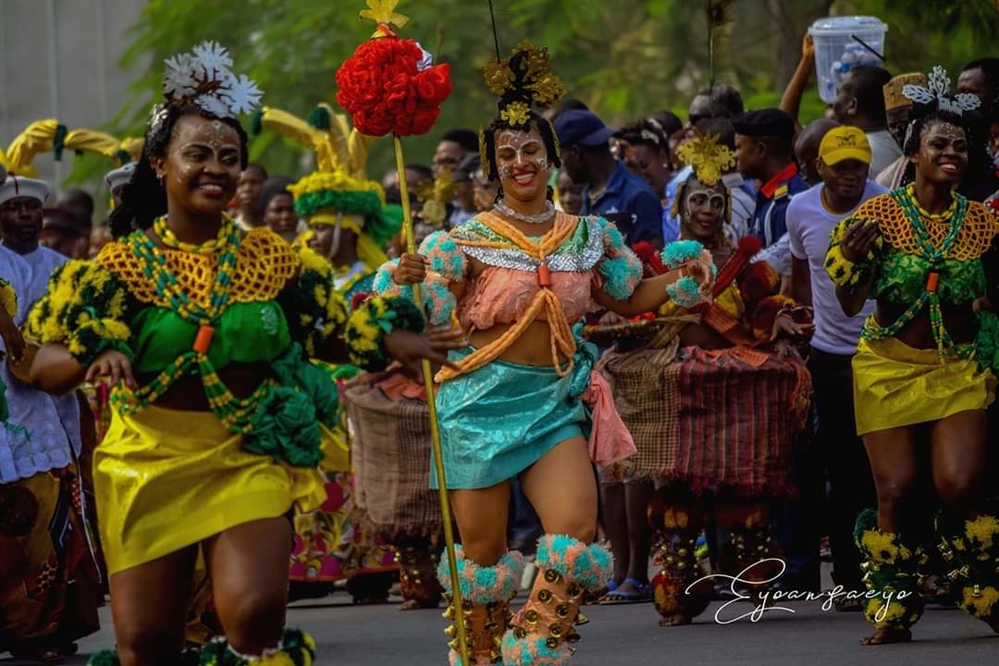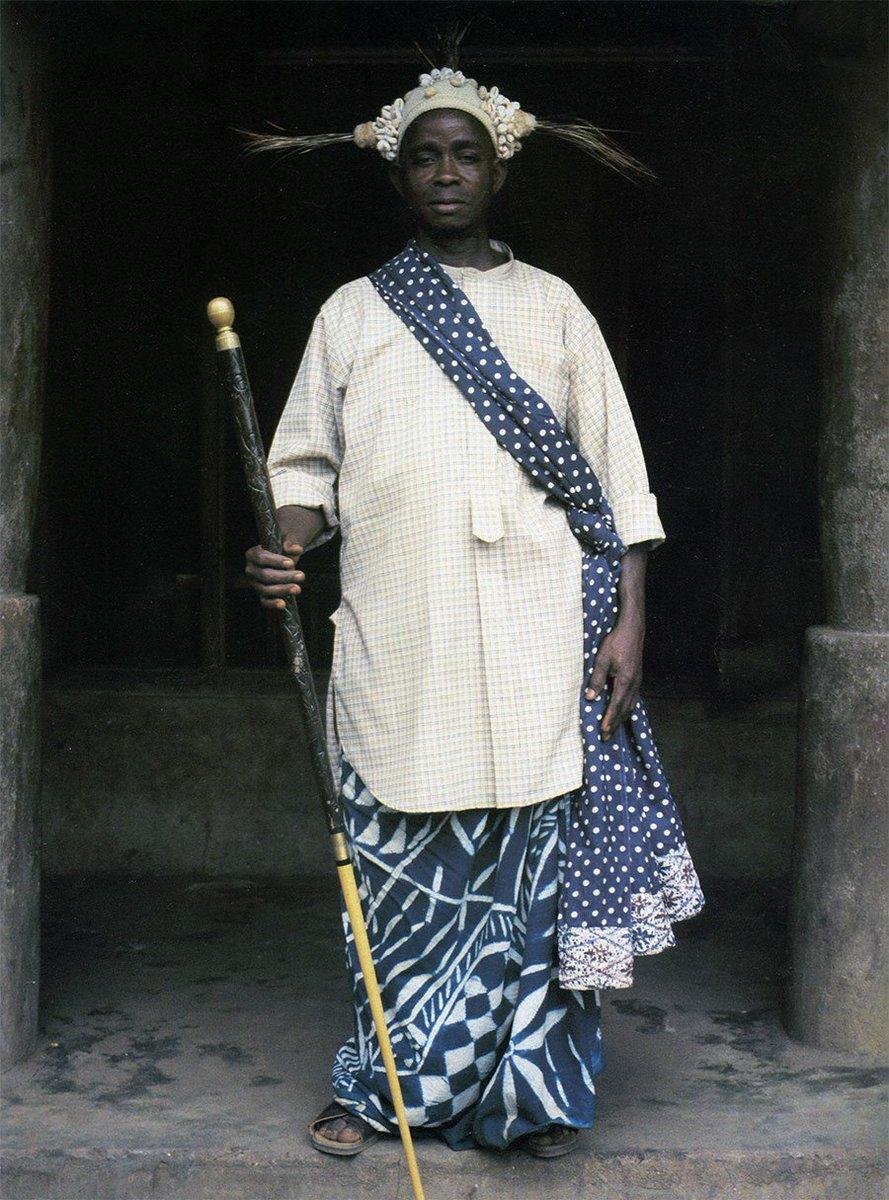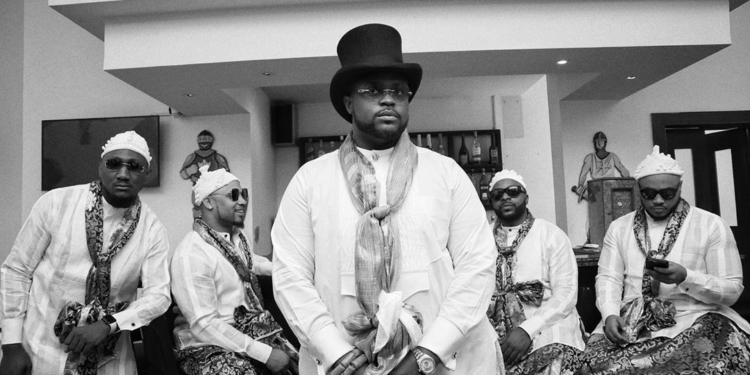Ever wonder what stylish traditional outfits are all about in Akwa Ibom state? You’re in for a vibrant fashion treat. The colorful fabrics and intricate designs of Akwa Ibom attire showcase a rich cultural heritage. Whether you’re a man or woman, young or old, there are endless options to feel proud of your roots.
In this article, you’ll discover 20 trendy Akwa Ibom traditional attires that will inspire you to embrace your cultural identity. The unique patterns, cuts, and embroidery featured in these outfits are eye-catching and bring out the beauty of the Akwa Ibom people.
Overview of Akwa Ibom State
Akwa Ibom is located in the coastal southern part of Nigeria, with over 5.5 million people from diverse ethnic groups like Ibibio, Annang, Oron, Eket, and Ibeno. The Ibibio make up the largest ethnic group. Akwa Ibom is bounded on the east by Cross River State for about 114 km (71 miles), mostly across Cross River, on the south by the Atlantic Ocean, and on the west by Rivers State for 52 km (32 miles), mostly across the Imo River and Abia State to the west and north for 151 km (94 miles).
The state Akwa Ibm, derives its name from the Qua Iboe River, which bisects the state before flowing into the Bight of Bonny. Akwa Ibom was split from Cross River State in 1987, with its capital as Uyo and 31 other local government areas. Akwa Ibom culture is deeply rooted in traditional values and ancestral worship. The people hold festivals like Ekpo Masquerade Festival, Ikot Abasi Fishing Festival, and Usoro Ekong, which feature cultural dances, wrestling matches, boat regattas, and more.
The traditional attire reflects the rich cultural heritage. The cuisine is diverse, featuring dishes like nsukka with cocoa yam and vegetables, afang soup with okazi leaves, and edikaikong with pumpkin leaves and waterleaf. Staples are fufu, garri, rice, and plantains.
With a captivating culture, scenic landmarks, and hospitable people, Akwa Ibom is a must-visit destination. Experience the warmth, color, and vibrancy of Akwa Ibom’s traditional life.
Overview of Akwa Ibom Traditional Wear
The traditional attire of the Akwa Ibom people is bold, colorful, and intricate. An overview of the main pieces:
- Wrapper and blouse: The wrapper is a colorful cloth tied around the waist over a blouse. The wrapper comes in different patterns, with ‘George’ material being popular.
- Headtie: Akwa Ibom women complete their look with a headtie, also known as Ofong Ibuod. The Ofong Ibuod is wrapped around the head, with different styles symbolic of the woman’s marital status or religion.
- Beads and coral: Beads, especially the red ‘sando’ beads, are an important part of a woman’s attire. So, too, are coral beads, which are believed to have protective powers.
- Men’s outfit: For men, a traditional outfit includes a shirt, wrapper, and maybe a cap. The wrapper is tied around the waist. The shirt is decorated at the sleeves and hem.
The vibrant and symbolic traditional attire of the Akwa Ibom people reflects their rich cultural heritage. Wearing these clothes, especially for special occasions, is a source of great pride.
Akwa Ibom Traditional Wear
The traditional attire of the Akwa Ibom people is vibrant, colorful, and unique. The cultural heritage of Akwa Ibom is expressed through its traditional clothing. Both men and women have distinct traditional outfits that are worn during cultural festivals, ceremonies, and events.
Akwa Ibom Traditional Attire for Female
The traditional attire for Akwa Ibom females is brightly colored and heavily embroidered.
Maiden Ankara Outfit
https://www.instagram.com/p/Cd1LokzruxK/?igsh=MzY1NDJmNzMyNQ==
This outfit features a dress made of vibrant Ankara fabric accessorized according to individual preferences, such as with a matching head tie, jewelry, and shoes.
Black, Silver, and Golden Onyonyo
https://www.instagram.com/p/CePAxPFOtgY/?igsh=MzY1NDJmNzMyNQ==
The onyonyo is a long, flowing gown that is occasionally beaded. This Akwa Ibom traditional clothing for ladies is often worn by the royal family, brides, and anybody celebrating an elaborate event. It’s designed as an off-shoulder that wraps around in a long flow with a sequenced fabric and a sateen George.
Straight Fitted Gown with Gele
https://www.instagram.com/p/CanK-mpLzSG/?igsh=MzY1NDJmNzMyNQ==
A floor-length fitted gown in a vibrant material print is matched with a matching headgear coordinating color or pattern, wrapped in an elaborate style, and adorned to create a dramatic focal point. This regal outfit is perfect for special occasions.
Purple and Silver Onyonyo
https://www.instagram.com/p/CmCIzqTtGAQ/?igsh=MzY1NDJmNzMyNQ==
This Onyonyo is made up of velvet and George fabric, with a silver apparel accessory. It is made with intricate hands and ends in a long flow. This Ibibio traditional attire for ladies is appropriate for any event.
Akwa Ibom Traditional Attire for Male
The traditional attire for men in Akwa Ibom consists of shirts and trousers made from cotton. The most common are:
White Shirt on Deep Blue Usobo
https://www.instagram.com/p/CWkh8p2MSAz/?igsh=MzY1NDJmNzMyNQ==
The white shirt is worn over a blue osobo that is knotted at the knee in a slanting pattern. The okpomkpomon is worn over a shirt and is usually accompanied with a matching walk stick, headgear, and shoes.
White Shirt On Peach Usobo
https://www.instagram.com/p/CcNIcTjuLLK/?igsh=MzY1NDJmNzMyNQ==
A simple yet stylish look, pairing a white shirt with a Usobo peach wrapper. The Usobo comes in colorful prints and patterns. The white shirt and Usobo are worn without the Okpomkpomon but with corresponding coral beads. This Usobo is made of George material and is tied to be just below the knee.
White Shirt on White Usobo With a Black Jacket
https://www.instagram.com/p/CRyhk1pBzug/?igsh=MzY1NDJmNzMyNQ==
This white shirt on White Usobo with a black jacket embroidered is an excellent choice for any groom. The George material is tied a little higher up on the feet. This Annang traditional dress can be worn at any function, not just a wedding.
White Shirt on Sky Blue Usobo
https://www.instagram.com/p/CeMAtxzKsMu/?igsh=MzY1NDJmNzMyNQ==
The sky blue Usobo has tonal embroidery and complements the white shirt nicely. A matching Okpomkpomon is knotted around the neck of the white shirt on the sky-blue Usobo. The dress is frequently worn by Akwa Ibom state grooms and during significant events such as chieftaincy coronations.
Usobo
https://www.instagram.com/p/C0b9DECtpWI/?igsh=MzY1NDJmNzMyNQ==
In most cases, usobo clothing covers the knees. It is a long piece of gleaming material that reaches the ankles. This material is wrapped around the waist and fastened at the hip.
Top hats

Many Akwa Ibom men choose to wear top hats to public functions. Others are dressed with lovely beaded native headgear. Some people wear bowler hats or colorful caps, which are typically associated with other tribes.
Okpompomon
https://www.instagram.com/p/CtsF9xUtJva/?igsh=MzY1NDJmNzMyNQ==
Okpomkpomon is a long cloth that is knotted around the neck. It is tied multiple times in knots or with other cloth and worn like a long scarf. The color of the cloth is usually the same as the bride’s dress or the wrapper around the hips. Instead of the Okpomkpomon, some guys choose coral beads.
Akwa Ibom Cultural Attire
Here are common Akwa Ibom Cultural Attire:
Ofod Ukod Anwang For Men
https://www.instagram.com/p/CUVBfx7MnkR/?igsh=MzY1NDJmNzMyNQ==
A wrapper is knotted around the waist, and a white shirt is worn over it. The groom generally wears this clothing during a traditional wedding ceremony or other significant traditional rites.
Ofod Ukod Anwang For Women
https://www.instagram.com/p/CVFsn-TsF0G/?igsh=MzY1NDJmNzMyNQ==
It is made up of a knee-length dress or skirt wrapped around the waist and a short beaded blouse that covers only the top half of the body. Ekpa ku kwa are fluffy ornaments worn around the arms and legs.
Ekombi Cultural Dance Attire

The attire is designed particularly for the Ekombi or Abang dance. Women wear ofod ukod anwang, which is embellished with Ekpa ku kwa, hand and leg jewels. Men, on the other hand, wear a white polo shirt with a small wrapper tied around their waist.
Ukara Outfit

The Ukara outfit is blue and white with insibidi signs and is primarily worn during Akwa Ibom State’s Ekpe masquerade holiday season. Men use it as a wrapping or hang it on their body to allow it to fall freely.
Akwa Ibom Traditional Marriage Attire
The Akwa Ibom traditional marriage attire is colorful and vibrant. There are a few main combinations you’ll see during the ceremony:
Black and Silver Combination
https://www.instagram.com/p/C0CwCqPLkP_/?igsh=MzY1NDJmNzMyNQ==
Black is a common traditional wedding outfit combo in Akwa Ibom. The bride dresses simply in a black and silver gown, while the husband dresses in a white shirt worn over a black or similar black and silver combination Usobo.
White and Golden Combination
https://www.instagram.com/p/C0b9DECtpWI/?igsh=MzY1NDJmNzMyNQ==
The white and gold color scheme is perfect for any Akwa Ibom traditional wedding outing. The groom is dressed in a white shirt with a matching golden usobo, while the bride is dressed elegantly in a gold Unyonyo.
White and Red Wine Outfit
https://www.instagram.com/p/CYmtTI0rSte/?igsh=MzY1NDJmNzMyNQ==
The groom wears a white shirt and wine-red usobo, while the bride wears a stylish unyonyo made of well-constructed George cloth.
Green Combination
https://www.instagram.com/p/CzGj_yFt1L1/?igsh=MzY1NDJmNzMyNQ==
The husband wears a matching green Attire to match the bride’s dress. They can accessorize with bead necklaces, headgear, and hats.
Silver and Blue Combination
https://www.instagram.com/p/CuPewAet4d4/?igsh=MzY1NDJmNzMyNQ==
The Groom wears a blue Usobo, while the bride wears a white elegant gown.
The Akwa Ibom people take great pride in their cultural heritage, and traditional attire plays an important role in expressing their unique identity. The clothing of both men and women is not only practical but also symbolic, with certain styles and accessories indicating one’s social status within the community.
Accessorizing Akwa Ibom Traditional Wear
To complete the look, accessorizing your Akwa Ibom attire is a must. Some key accessories include:
- Coral beads: Colorful coral beads are popular and worn around the neck, wrists, and ankles. The bright red tones pop against the mostly blue attire.
- Headties: Elaborate headties made of the same fabric as the clothing are tied around the head. They come in a variety of styles, including some with beaded or embroidered accents.
- Walking sticks: Decorated walking sticks are carried by men, originating as a symbol of status and authority. They are carved from wood and often feature metallic accents.
- Fans: Intricately designed fans made of dyed raffia palm leaves are used by women to keep cool in the hot climate. They come in a variety of shapes, including circular and crescent moon.
- Caps: Men will often wear caps made of woven fibers like sisal. They provide shade from the sun and complete the look.
To achieve an authentic and fashionable Akwa Ibom look, do not skimp on the accessories. They are an integral part of the cultural dress and add visual interest. When adorned in brightly colored clothing and accessorized with beaded jewelry, decorative walking sticks, and fans, you will surely turn heads!
Where to Buy Authentic Akwa Ibom Clothing
There are several places where you can purchase authentic Akwa Ibom attire.
Local Markets
The best places to find traditional Akwa Ibom clothing are the local markets within the state, such as Itam Market in Uyo, Ikot Ekpene Main Market, and Abak Main Market. Here, you can find a wide selection of handmade garments sold by local traders at affordable prices. Look for fabrics like raffia, aso oke, and George materials, which are commonly used.
You may have to do some bargaining, but buying directly from these markets ensures your money goes straight to the craftspeople and helps support the local economy. Just be prepared for large crowds and get there early. If visiting from outside the state, go with a guide who can help you navigate the markets and communicate with the traders.
Designer Boutiques
In recent years, several contemporary fashion designers from Akwa Ibom have started boutiques featuring modern takes on traditional attire using local textiles and tailoring techniques. Their stylish and high-quality pieces are perfect if you want to make a fashionable statement while promoting cultural heritage.
Online Retailers
For convenience, you can also find Akwa Ibom clothing from various online retailers based within Nigeria, such as Jumia, Konga, and Facebook Marketplace. While prices may be slightly higher, it saves you the trip of traveling to local markets. Just be sure to check reviews to ensure the retailer is reputable and actually sources authentic garments. Some individual designers and boutiques also have their e-commerce stores where you can shop from anywhere.
Frequently Asked Questions
Here are some of the most asked questions about Akwa Ibom Attire:
How do I wear the Akwa Ibom attire?
The Akwa Ibom traditional attire consists of a blouse/top, a wrapper/skirt for women, or trousers for men. The blouse is usually decorated with Akwa Ibom symbols like the walking stick, sword, and feather. The wrapper is tied around the waist, and the trousers are loose and flowy. Accessories like coral beads, bangles, earrings, necklaces, and head ties complete the look.
What fabrics are used?
Popular fabrics for Akwa Ibom attire include George, Hollandaise, and Ankara. George and Hollandaise are colorful cotton fabrics with floral and geometric prints. Ankara is a vibrant wax-print cotton fabric with distinct patterns. These fabrics are breathable, comfortable, and suited for the hot climate.
What are the colors and patterns?
Bright colors like red, yellow, green, and blue are common in Akwa Ibom attire. Patterns include flowers, leaves, animals, and abstract shapes. The color and pattern communicate the wearer’s mood or the occasion. For example, red and black are for special occasions, while light colors are for everyday wear.
Conclusion
So there you have it, a stylish round-up of the trendiest Akwa Ibom attire to rock at your next traditional event. Whether you prefer the elaborate elegance of the Ibibio attire or the more minimalistic Efik dress, there are so many options to choose from to showcase your cultural pride.
The vibrant colors, striking embroidery, and bold patterns are sure to turn heads. Now, all that’s left to do is pick out your favorite ensemble and go out there and celebrate the rich cultural heritage of Akwa Ibom in style.


Discussion about this post